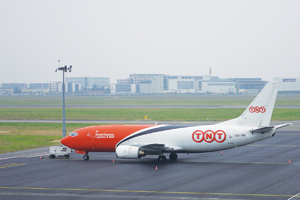FedEx Moves Bid Forward, Makes Offer for TNT Shares

This story appears in the Aug. 31 print edition of Transport Topics.
FedEx Corp. last week took the next step in its planned $4.9 billion acquisition of Dutch package and freight company TNT N.V. by launching a tender offer for its shares.
The plan calls for FedEx, which intends to expand its global capability through the acquisition, to spend 8 euros (about $9) per share for TNT. It was announced April 7.
The offer, which will end Oct. 30 unless extended, was disclosed in a 292-page document released in accordance with Dutch law. TNT shareholders will vote Oct. 5 whether to approve the acquisition.
The European Commission is reviewing competitive ramifications of the proposal. If approved, the deal could move FedEx revenue above $55 billion annually and push the company ranked No. 2 on the Transport Topics Top 100 list of U.S. and Canadian for-hire carriers closer to No. 1 UPS Inc., whose 2014 revenue totaled $58.2 billion.
Two years ago, the EC rejected UPS’ bid for TNT, citing a reduction in competition. FedEx and TNT have said they’re confident their proposal will be approved.
“The process of obtaining all necessary approvals and competition clearances is on track and evolving in line with the previously communicated timetable,” the statement said. The EC has scheduled a decision by Jan. 13. “The transaction presents a highly pro-competitive proposition.”
After completion, the combined market share of FedEx and TNT’s package business in Europe would be similar to rival package carriers UPS and DHL, based on an industry analysis.
FedEx has said it will sell TNT Airways, which has 50 planes, to help win approval of the transaction. FedEx, which has about 650 aircraft, will absorb TNT shipments into its network.
“We believe the combination will provide significant value to both companies and both sets of shareholders. FedEx is delighted by the unanimous support from the executive board and the supervisory board,” said David Binks, regional president of FedEx Express in Europe.
In the offering document, the companies detailed the six-week period before the announcement, beginning with a Feb. 25 overture from FedEx CEO Frederick Smith to the chairman of TNT’s board.
The offer was 41% higher than the share price over the month before the announcement. FedEx offered 1.5 fewer euros per share than the 2012 UPS proposal.
The U.S. company is far more profitable than TNT. Memphis, Tennessee-based FedEx’s profit before interest and taxes in the two most recent quarters was about 50 times larger than Hooffddorp, Netherlands-based TNT.
The statement disclosed that after the purchase, TNT’s supervisory board would have three members appointed by FedEx and two holdovers from TNT. FedEx Express President David Bronczek would be chairman.
An executive board would include Binks, as CEO, another FedEx appointee and TNT Chief Financial Officer Maarten de Vries.
The TNT official agreed to remain as CFO for six months after the closing, expected in the first half of 2016. But Tex Gunning, current CEO of TNT, will leave when the acquisition is complete, the companies announced.
FedEx arranged 2 billion euros of new debt to accompany 1.5 billion euros in cash and 900,000 from a credit facility.
Chinese and Brazilian regulators also must approve the plan.
In a separate development involving FedEx worker status, the 8th U.S. Circuit Court of Appeals in St. Louis ruled that a trial judge improperly found that Ground unit drivers were employees rather than FedEx contractors. Instead, the Appeals Court said a jury should have decided worker status.
Drivers throughout the country have filed claims against the carrier, which have been consolidated in a federal case in Indiana. Laws of each state, however, determine the employee-contractor issue, the appellate court said.
The ruling gives the company a chance again to defend the contractor status, a core component of its business model.
The company has said it has won at least 100 worker status cases in defending the independent contractor status. Recent court rulings in California and Kansas have favored classification of Ground workers in those states as employees.

